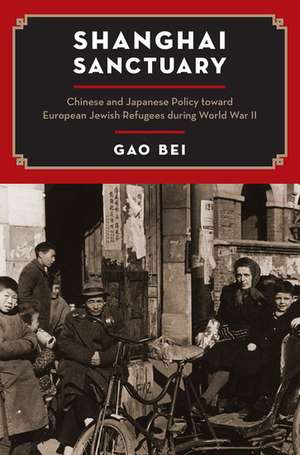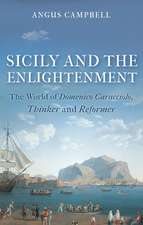Shanghai Sanctuary: Chinese and Japanese Policy toward European Jewish Refugees during World War II
Autor Gao Beien Limba Engleză Paperback – 27 oct 2016
Preț: 237.68 lei
Preț vechi: 270.32 lei
-12% Nou
Puncte Express: 357
Preț estimativ în valută:
45.49€ • 47.31$ • 37.55£
45.49€ • 47.31$ • 37.55£
Carte tipărită la comandă
Livrare economică 03-09 aprilie
Preluare comenzi: 021 569.72.76
Specificații
ISBN-13: 9780190491581
ISBN-10: 0190491582
Pagini: 198
Dimensiuni: 155 x 231 x 13 mm
Greutate: 0.32 kg
Editura: Oxford University Press
Colecția OUP USA
Locul publicării:New York, United States
ISBN-10: 0190491582
Pagini: 198
Dimensiuni: 155 x 231 x 13 mm
Greutate: 0.32 kg
Editura: Oxford University Press
Colecția OUP USA
Locul publicării:New York, United States
Recenzii
Basing her work on documents from American, Chinese, Japanese, and Taiwanese archives, Gao follows a clearly innovative approach that offers a dual reading of the policies and practices of the Nationalist Chinese government, on the one hand, and the Japanese government and military forces in occupied Manchuria and China, on the other... Gao's book...provid[es] us with a rich archival documentation that, still today, remains relatively unexplored, makes an undeniable contribution to a larger, more up-to-date awareness of the topic.
[T]he political context provided by Gao Bei makes her monograph a welcome contribution... The monograph is...well written and engaging. [T]his is a thorough treatment of Chinese and Japanese approaches to Jewish refugees and it deserves a wide audience.
Many books and articles have been written about [the Jews from central and eastern Europe who found refuge in Shanghai during World War II] but, as the book under review demonstrate, there are always new documents to be tapped. Gao Bei has managed to discover hitherto little-known sources... This well-researched book contributes to our knowledge of the subject.
Gao investigates and compares the processes of Chinese and Japanese policy toward Jews against the backdrop of rising nationalism, the Second Sino-Japanese War, and World War II... This deep but concise study draws from compelling archival sources in China, Taiwan, and Japan that truly sets in apart from previous scholarship about the Jews of Shanghai... The integration of Chinese and Japanese primary and seconday sources also allows Gao to advance new information about the Chinese and Japanese interactions with Shaghai Jews.
The movement of Jewish refugees from Hitler's Europe to Shanghai is well known. Using new sources, Gao Bei explains the less understood riddle of Chinese and Japanese thinking on the Jewish question and on Jewish settlement in East Asia, all within the context of the fighting from 1931 to 1945. An important and welcome book.
Gao Bei uses rich new sources to tell the story of the Chinese and Japanese treatment of Jewish refugees during World War II. The book sheds much-needed light on the history not only of modern Jewish experience, but of nation-building in East Asia.
Gao Bei paints a fascinatingly intricate picture... [She] has a keen eye for detail and also provides the reader with an elaborate overview... Richly-illuminating.
By moving away from the more familiar Eurocentric narrative, Gao offers a refreshing look at the difficulties, prejudices and motivations in government responses to Jewish refugees and the Holocaust."-European History Quarterly
[T]he political context provided by Gao Bei makes her monograph a welcome contribution... The monograph is...well written and engaging. [T]his is a thorough treatment of Chinese and Japanese approaches to Jewish refugees and it deserves a wide audience.
Many books and articles have been written about [the Jews from central and eastern Europe who found refuge in Shanghai during World War II] but, as the book under review demonstrate, there are always new documents to be tapped. Gao Bei has managed to discover hitherto little-known sources... This well-researched book contributes to our knowledge of the subject.
Gao investigates and compares the processes of Chinese and Japanese policy toward Jews against the backdrop of rising nationalism, the Second Sino-Japanese War, and World War II... This deep but concise study draws from compelling archival sources in China, Taiwan, and Japan that truly sets in apart from previous scholarship about the Jews of Shanghai... The integration of Chinese and Japanese primary and seconday sources also allows Gao to advance new information about the Chinese and Japanese interactions with Shaghai Jews.
The movement of Jewish refugees from Hitler's Europe to Shanghai is well known. Using new sources, Gao Bei explains the less understood riddle of Chinese and Japanese thinking on the Jewish question and on Jewish settlement in East Asia, all within the context of the fighting from 1931 to 1945. An important and welcome book.
Gao Bei uses rich new sources to tell the story of the Chinese and Japanese treatment of Jewish refugees during World War II. The book sheds much-needed light on the history not only of modern Jewish experience, but of nation-building in East Asia.
Gao Bei paints a fascinatingly intricate picture... [She] has a keen eye for detail and also provides the reader with an elaborate overview... Richly-illuminating.
By moving away from the more familiar Eurocentric narrative, Gao offers a refreshing look at the difficulties, prejudices and motivations in government responses to Jewish refugees and the Holocaust."-European History Quarterly
Notă biografică
Gao Bei is Assistant Professor of History and International Studies at the University of North Carolina Wilmington.











